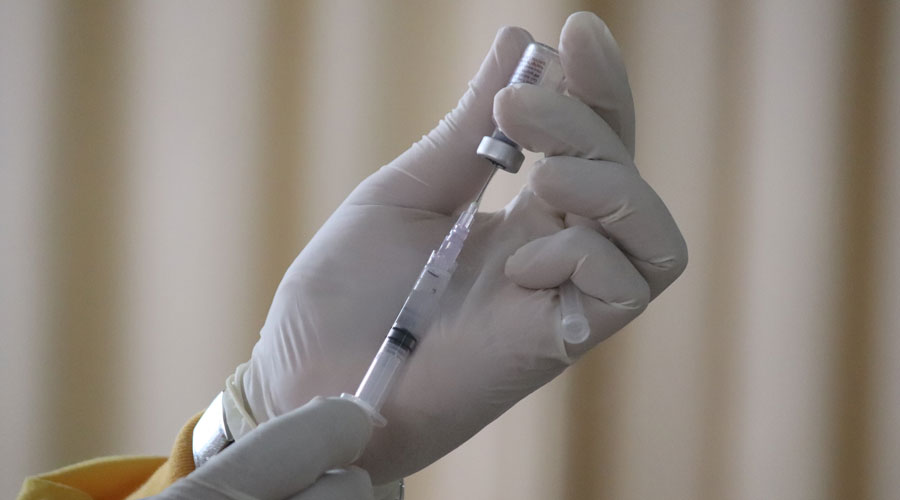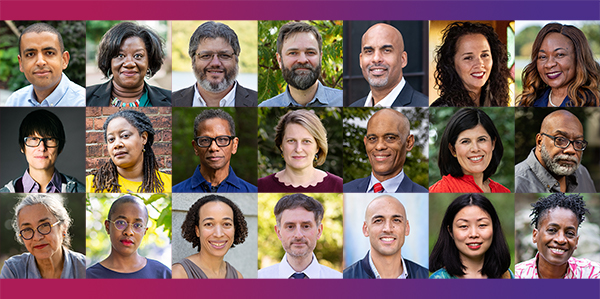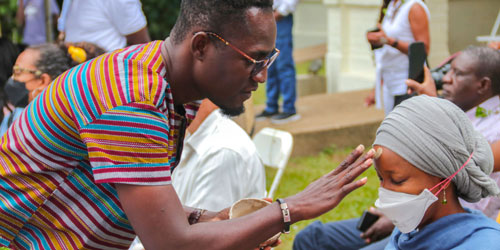MacArthur Fellow and evolutionary geneticist Nels Elde discussed the Delta variant of COVID-19, whether new vaccines will eventually need to be developed, and what comes next.

Summer 2021 saw the return of full capacity events indoors and outdoors in the United States. Mask restrictions relaxed. And Americans began to resume activities that they enjoyed before the COVID-19 pandemic upended routines in early 2020.
Then the Delta variant entered the conversation.
In response, the Centers for Disease Control and Prevention (CDC) changed its mask guidance, recommending that fully vaccinated people wear masks in public indoor areas with substantial or high transmission. Though COVID-19 vaccines are widely available, news of Covid-19 breakthrough infections among vaccinated people as many of us wondering how to stay protected and what comes next.
MacArthur Fellow and evolutionary geneticist Nels Elde studies host-pathogen interactions. His work, which looks at evolutionary processes in organisms, has potential implications in the treatment of infectious diseases. So we spoke to him about the Delta variant of SARS-CoV-2 (the virus that causes the disease COVID-19), whether new vaccines will eventually need to be developed, and what we can expect next:
Many Americans believed that with vaccines widely available, the COVID-19 pandemic would end this summer. Why the change in guidance from public health authorities?
The pandemic is unfortunately not over. The two most obvious curveballs are vaccine campaigns badly stalling in many states and the rapid spread of the so-called Delta variant here and abroad. Couple that with a massive uptick in summer travel and crowded gatherings, and we are heading in the wrong direction at the moment.
Many Americans are still reluctant to be vaccinated, even with the Delta variant spreading. Why is this, and what can be done?
Hitting the wall on vaccinations is heartbreaking. My sense is that lots of people have lots of different reasons, ranging from personal to political, for delaying or refusing vaccination. I think some patience is warranted here.
We should seek out friends and family unsure but open to conversations and have these ongoing conversations. I have done this with some friends at a community garden where I grow vegetables and supervise chickens. I am not sure if my friends are now vaccinated, but the conversations have been eye-opening, positive, and also helped me feel part of my local community. As more information becomes available, my hope is that more vaccine needles can help turn the tide on SARS-CoV-2 and potential future variants that may emerge down the line.
Why have vaccine rollouts been successful in some countries and not others? With the pandemic still raging abroad, what can we do to help, individually and collectively?
There is, of course, a strong correlation between having resources and connections and mounting successful vaccine rollouts. Countries like Israel pair their close partnerships with pharmaceutical companies alongside strong public health guidelines and data sharing that made their vaccination program a big success relative to other countries. At the other end of the spectrum, massive challenges exist for getting vaccines to countries with large rural populations that have limited infrastructure and resources. This is not my area of expertise, but my sense is that prioritizing vaccines to urban areas with large populations of unvaccinated people is a big priority. That is a massive undertaking, especially given lagging distribution and even potential vaccine hoarding so far by wealthy countries.
We need to do more. Wide vaccine distribution is both in the United States’ self-interest and the interest of the world. I support international organizations with donations to help acquire and distribute vaccines. Collectively, we should do more to organize, write our representatives, and let them know that more needs to be done to distribute vaccines globally.
How worried should vaccinated and unvaccinated people be about contagion with regards to the Delta variant?
At this stage in the pandemic, the choice we are making is to get vaccinated or get infected with SARS-CoV-2. If I were unvaccinated, I would be worried because hospital intensive care units are filling up again with patients, and the vast majority of them are unvaccinated. The chance of spreading SARS-CoV-2 when newly infected is high, and even surviving COVID-19 can mean long-term impacts that almost certainly also affect friends, family, and others.
As someone who is vaccinated, I am much less worried, but I do feel some concern. The risk of serious consequences from infection are very low, but the CDC is weighing data that virus loads from the Delta variant can be substantial even in vaccinated people, raising the possibility of ongoing transmission. As I am writing this, we are seeing new evidence for virus loads in some vaccinated people that might be involved in transmission. For parents of younger children and people with unvaccinated contacts, engagement in preventative measures like mask wearing seems warranted as we learn more. Mandating masking and vaccination seems especially prudent in health care settings and schools.
New variants seem to keep popping up every few months, with each new one more contagious than the one before. Is there a point where a new variant will render the current coronavirus vaccines ineffective?
One of the frustrating things here is that we can quickly identify new variants, but it takes much longer to better understand the impact of the mutations that the variants carry. The Delta variant seems to outcompete other variants very quickly. However, for the virus, it only takes a minor change compared to other variants to see these patterns of spread. In the meantime, many countries including, the United States, made a major shift in their approach to the pandemic, returning to something close to non-pandemic life. Under these conditions, especially given modest vaccine uptake, any SARS-CoV-2 variant was bound to flare up and spread. The good news is that vaccines are still holding up with the Delta variant, especially as it relates to avoiding severe disease and death.
I am also starting to hear chatter in the news and from some colleagues about a newly-identified Lambda variant that might come on the radar in a bigger way in the coming months. It has new combinations of some mutations we have already seen in other variants and could begin to outcompete the Delta variant. However, other variants are likely to get into the mix as well.
At some point down the road, especially before vaccines are widely distributed and as the virus continues to burn through more unvaccinated people, a variant will likely emerge that defeats current vaccines. This would be defined as a variant of high consequence and perhaps even be classified as a new strain. The good news here is that the mRNA-based vaccines can be quickly redesigned to account for the new variants and strains. In fact, this is happening, and vaccines based on the different variants are already moving into production. So far, however, most vaccinated people are still in great shape in terms of vaccine-supercharged immune protection.
It appears that the COVID-19 pandemic may never end. How much longer do you think it will keep going in the United States and abroad?
I was feeling more optimistic at the beginning of the summer, but I am now less optimistic. We have seen cases rebound and vaccine uptake stall in many places around the United States, and vaccine efforts seem slow to get off the ground in many countries as well.
I anticipate SARS-CoV-2 outbreaks and flareups will continue for the foreseeable future. While vaccination is a fundamental game changer for mitigating risk of severe disease and death on the road to herd immunity, my bet is that the virus will continue to smolder and be with us for years to come.
This piece was originally published on Medium.
Related Medium Post
Five Things to Know This Summer About the COVID-19 (Coronavirus) Pandemic ›





